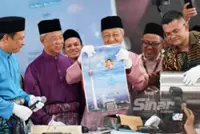KUALA LUMPUR: Malaysia aims to attract RM500bil of investment in integrated circuit (IC) design, advanced packaging and manufacturing equipment for semiconductor chips, says Datuk Seri Anwar Ibrahim.
The Prime Minister said under Malaysia's National Semiconductor Strategy (NSS) launched in April, Putrajaya also aims to establish at least 10 Malaysian companies in design and advanced packaging with revenue between RM1bil and RM4.7bil.
He also said that the federal administration has set a target of establishing about 100 semiconductor-related companies with a total revenue of RM1bil as an effort to create higher wages for Malaysians.
On top of that, the Prime Minister said the NSS will also see Malaysia being developed as a global research and development (R&D) hub for semiconductors.
"We will also develop Malaysia as a global R&D hub for semiconductors, featuring world-class universities, corporate R&D and centres of excellence, blending the very best of Malaysian and international talent.
"The NSS will also train and upskill 60,000 Malaysian engineers.
ALSO READ: Anwar to announce key strategies to uplift M'sia's semiconductor sector, says Tengku Zafrul
"The government will allocate at least RM25bil in fiscal support to operationalise the NSS with targeted incentives, details of which will be announced by the Investment, Trade and Industry Ministry soon," he said in his keynote address when launching the Semicon South-East Asia 2024 at the Malaysia International Trade and Exhibition Centre here on Tuesday (May 28).
Anwar said the salient features of the NSS are the crucial elements to ensure that the country achieves its ambition of becoming a global chip hub.
Under the NSS, which is led by the ministry, Anwar said the strategy is structured in three phases, which are designed to foster collaboration with companies across Asean, Asia and the global stage.
"Phase one involves building on our foundations, phase two is all about moving to the frontier and phase three is about innovating at the frontier.
"To stay flexible and agile, the NSS will be a living document, evolving as needed, but we remain steadfast in our aspiration to make Malaysia a major global player in accessible technology for all, powered by our semiconductor industry.
"In reaffirming Malaysia's commitment to becoming a global leader in the semiconductor industry, the NSS Task Force (NSSTF), with CREST serving as the secretariat, focuses on fostering innovation, enhancing R&D capabilities and driving the commercialisation of semiconductor technologies."
Anwar added that the country's key proposition of "Malaysia: Bridging
Technology for Our Shared Tomorrow" is a testament to its aspiration to promote technology for humanity's greater good.










































